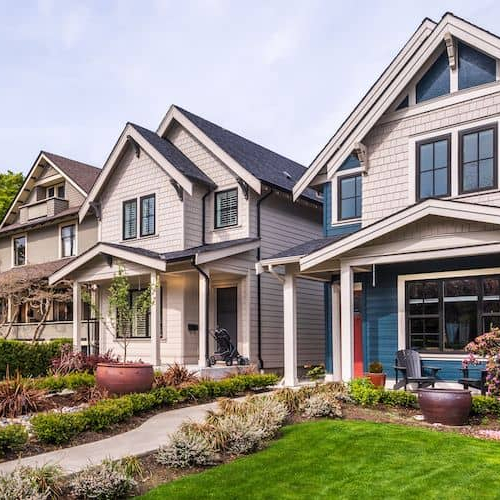What is rent control and how does it work?
Contributed by Sarah Henseler, Tom McLean
Jun 13, 2025
•7-minute read

It seems like a rule of life that everything gets more expensive over time. Groceries, car payments, and entertainment go up in cost without ever coming back down. This is especially true when it comes to rent.
But it’s not all as bleak as it seems. Many states regulate how fast your rent can climb. It’s called rent control, and knowing about it can net you major savings.
Key Takeaways:
- Rent control regulations limit how much your rent can increase.
- While rent-controlled units are less expensive, they also are harder to find because they’re so desirable.
- Alternatives to rent-controlled units include taking on roommates, Section 8 vouchers, public housing, and homeownership.
What is rent control?
Rent control refers to states and local limits on how much rent landlords can charge tenants. Rent control may set a total limit a landlord can charge for an apartment, how much your rent can increase each year, or other protections for tenants.
Rent stabilization is similar to rent control. Rent stabilization regulations allow rent to increase by a certain percentage each year rather than up to a set limit. It’s like rent control, but it gives landlords more leeway.
Rent control policies vary by location. For example, California established the Tenant Protection Act in 2020. Most properties built more than 15 years ago can only raise rent in a year up to 5% plus the cost-of-living increase or 10%, whichever number is less.
You’ll find statewide allowances for rent control laws on the coasts, such as California, New York, and New Jersey. But as of 2024, 33 states prohibit rent control regulations.
How does rent control work?
Let’s say you live in a rent-controlled apartment. The rent you pay goes toward your landlord, and over time, your landlord wants to raise your rent. Your local government sets limits as to how much that rent can go up so you can’t be hit with a surprise 50% price hike.
What if your rent skyrockets anyway? Then it’s time to report your landlord to your city’s housing authority. They will help you sort out any infractions that violate your tenant rights.
That being said, there are ways for landlords to raise rent beyond the set allowance. Regulations often allow rent hikes when a lease expires. If you’re moving into a rent-controlled apartment, you won’t necessarily pay what the previous tenant paid. Their lease expired to create your new lease, and in between those contracts the landlord may have the right to set a new base price.
However, you may be able to add yourself onto the previous tenant’s lease if you’re replacing a roommate. That way, the lease never expires and the landlord can’t reset the base rent amount. Do note that adding yourself as an extra roommate may trigger a rent increase, but this amount could also be capped by regulations.
The pros and cons of rent control
To understand the pros and cons of rent control, let’s take a step back and consider the policy from a wider perspective.
The pros of rent-controlled apartments and units
Rent control has plenty of financial benefits for tenants, landlords, and the community, such as:
- More stability. Neighborhoods with rent control avoid excessive rent hikes, which allows communities to remain in their homes longer.
- Increase spending money. When less of your money is going toward rent, it can instead go toward savings or other expenses.
- Fewer occupancy gaps. Landlords lose income when their properties go empty. Long-term residents that can afford their rent reduce the number of unoccupied units.
- Lower eviction rates. Rent control regulations often include protections against evictions. Plus, controlled rent increases make it easier for tenants to reliably afford payments.
The cons of rent-controlled apartments and rentals
On the other hand, rent control introduces complications that don’t benefit everyone involved. To name a few:
- Less profitable. With limits on how much a landlord can raise rent, profit margins from rent collecting are reduced.
- Poor upkeep. Smaller profits might incentivize landlords to skip out on necessary maintenance, placing an extra burden on tenants.
- Few in number. Rent controlled units can be difficult to find. These regulations can dissuade developers from building in rent-controlled areas, limiting availability.
How to find rent-controlled properties
If you’re looking for rent-controlled properties, you can start by searching online lists published by your city. There, you’ll find a range of units protected by these regulations. However, it might not be fully updated. It might list only some of the protected properties, and they likely won’t all be vacant.
While apartment shopping, ask the landlord or current tenant showing you the unit if it’s rent controlled. They should tell you, even if it’s not stated on the online listing.
Once you find a rent-controlled apartment, you may want to jump on it fast. These are popular units for obvious reasons, and depending on the availability in your city, the demand could be high.
Alternatives to rent-controlled apartments
Even though rent-controlled apartments aren’t available everywhere, you still have alternative ways to find affordable housing. Keep your monthly payments low by exploring some of these options.
Getting a roommate
While it may seem obvious, sharing a unit is an easy way to save money on housing. Not only are two-bedroom apartments cheaper for each tenant than one-bedroom apartments, but you can also save by splitting utilities and groceries – assuming they’re not a competitive eater.
You’ll want a roommate you can trust, which is why it’s important to verify their income. If it turns out they can’t pay as much as they claimed, you don’t want to be on the hook for covering a two-bedroom apartment yourself.
Also, get an agreement in writing on how you plan to handle one or both of you moving out. A minimum 1-month notice is a good rule of thumb so you have time to find a replacement roommate before next month’s rent.
Section 8 housing
Section 8 housing is a voucher program for low-income individuals and families who need affordable housing. If you qualify, you’ll receive a voucher that covers the monthly rent that you can’t afford.
This program is backed by the U.S. Department of Housing and Urban Development and works for rent payments across the country. However, not all jurisdictions require landlords to accept Section 8 vouchers. Check your city’s laws to verify if your application rejection is valid or not.
See your local housing authority to see if your income level fits with the Section 8 program. The waitlist could be long, so start the process early.
Public housing
In addition to Section 8, HUD also sponsors public housing. Like rent control, public housing applies to specific units that have controlled rental costs.
Every city will offer different amounts and types of public housing. You can find apartments, townhouses, and even single-family homes with reduced rent.
Public housing accepts only those with financial need. If you’re within the required income level, apply early in case there’s a long waitlist.
Buying a home
In the long-term, buying a home might be cheaper than renting. We know that sounds odd but hear us out.
The initial down payment and closing costs are an expensive hurdle, and it’s understandable that this alone makes owning a home out of reach for many. But if you can afford that initial cost, monthly mortgage payments can be cheaper than rent.
Over time, you’ll build equity with your mortgage payments, which is the amount of real estate value that you own. If you move to a second house, you get to keep that built-up value even if you haven’t finished paying off the entire property. Rent, on the other hand, only disappears.
If homeownership is something you’re interested in exploring, start by learning about the different types of mortgages that could make it happen.
FAQ
Below you’ll find some answers to common questions regarding rent control.
How will I know if I’m living in a rent-controlled apartment?
You would generally learn if you’re in a rent-controlled apartment during the application process before you moved in. Your landlord should disclose this information, and if they haven’t, you can ask them. Alternatively, you can find out through your local housing authority. Remember, your rent can still go up in a rent-controlled unit.
How can I find a rent-controlled apartment if I’m not already in one?
Your local housing authority can help you identify rent-controlled apartments in the area. If that’s not an option and you have a financial need, they could also help you learn if programs like Section 8 or public housing are right for you.
Does rent control stop gentrification?
Gentrification is the process of home values in a neighborhood rising, pushing away its current residents to cheaper housing elsewhere and disrupting communities. Rent control puts restrictions on how much rent can increase, thereby protecting residents from unexpected price hikes.
What is the history of rent control?
Rent control regulations first appeared in the early 20th century. When World War II brought a booming economy to the country, many Americans who suffered through the Great Depression had difficulty keeping up with rent spikes. New York City policymakers enacted price ceilings and rent freezes to help these Americans stay in their homes, and the practice has evolved over the years to what we see today.
Are any property types exempt from rent control laws?
Exemptions depend on local or state laws. Sometimes, rent control only applies to city buildings built before a set year. Luxury condominiums and homes might also not have rent protections.The bottom line: Rent control stabilizes housing costs
In a time of rising costs, moving into a rent-controlled unit is one way to mitigate monthly expenses. With more predictable and reasonable rent increases, you can afford to stay in your home for a long time.
These units are not easy to find, so check with your local housing authority or ask around to get leads. If a unit opens up, take this budget-friendly opportunity into consideration.
Of course, you can always explore other cost-saving living situations. Roommates, Section 8, and public housing all offer the chance to put less of your budget into expenses and more into savings.
If buying a house and skipping rent altogether piques your interest, start the mortgage approval process today with Rocket MortgageⓇ online, or give us a call at (833) 326-6018.

Michael Rosenthal
Michael Rosenthal brings over a decade's worth of experience writing for finance, tech, education, and entertainment. He earned his bachelor’s in writing and a certificate in public & professional writing from the University of Pittsburgh along with a master’s in television production from Boston University.
His previous work includes developing personal finance education for a Fortune 500 company and articles for various mortgage lenders. When he’s not writing for Rocket Mortgage, Michael spends his time fixing up his well-aged home in Los Angeles one leaky sprinkler at a ti
Related resources

5-minute read
Freddie Mac: What is the Federal Home Loan Mortgage Corporation (FHLMC)?
Freddie Mac is a government-sponsored agency charged with keeping mortgage markets liquid. Learn more about FHLMC – and how it impacts home buyers and ...
Read more

4-minute read
Low-income moving assistance programs
There are many moving assistance programs and resources available to those who need extra help affording moving expenses. Explore your options here.
Read more

8-minute read
What is Ginnie Mae (GNMA) and how does it work?
Discover how Ginnie Mae guarantees mortgage-backed securities, supports the housing market, and helps make homeownership more affordable.
Read more